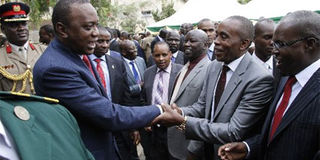Leaders demand court action against officials under probe

President Uhuru Kenyatta greets Members of Parliament and Senators after making his State of the Nation address on March 26, 2015. PHOTO | JEFF ANGOTE |
What you need to know:
- That the President said the list he presented was authored by the EACC chief executive and not its chairman, Mr Mumo Matemu, was telling, according to Mr Murkomen.
- President Kenyatta said he was unhappy with the slow progress of the vetting and asked Parliament to “reflect on a more effective way” to investigate the senior officers.
- Nyeri Woman Representative Priscilla Nyokabi said the President had made up for a “flat” address he gave last year.
Members of Parliament and other leaders have welcomed President Kenyatta’s directive to public officers linked to corruption to leave office.
They said the directive was a bold move that would help the nation to open a new leaf in the fight against the vice.
The President yesterday, during his State of the Nation address in Parliament, presented a list and asked those named on it to leave office.
The list was compiled by Ethics and Anti-Corruption Commission Chief Executive Officer Halakhe Waqo. It will be tabled in the National Assembly on Tuesday.
The lawmakers also welcomed the public apology made by the President for past injustices meted upon Kenyans by the previous regimes, although some said it was not enough.
National Assembly Majority Leader Aden Duale said Kenya had opened a new front in the fight against corruption, saying the President had given his best speech.
“Kenya has today had a new beginning in the war against corruption. The report will be tabled in the House on Tuesday,” Mr Duale said.
Elgeyo-Marakwet Senator Kipchumba Murkomen said the President had showed that he did not fear battling corruption.
“The directive shows that the President is leading from the front in fighting corruption.
FOLLOWED BY ACTION
“It is no longer about parochial and ethnic interests and he has shown that he is willing to fight it,” he said.
That the President said the list he presented was authored by the EACC chief executive and not its chairman, Mr Mumo Matemu, was telling, according to Mr Murkomen.
However, members from the Opposition said the directive should be followed by action.
“The directive by the President follows pressure from the Opposition.
“We want the list to be made public so that Kenyans know who has been mentioned,” said Suba MP John Mbadi.
Makueni Senator Mutula Kilonzo Jr said: “The directive is a bold move. But we expect now action to follow. It also shows that EACC and DPP have been unable to do their work as expected.”
However, he said the public apology was not enough. “There are some occurrences that you cannot just apologise for, like (the massacre in) Wagalla and the 2007 post-election violence”.
“The apology should be followed by retribution and restorative actions.”
Nyeri Woman Representative Priscilla Nyokabi said the President had made up for a “flat” address he gave last year.
“Last year I was a bit disappointed because he gave a flat address but this time it is the best.
“He gave solutions to problems facing us instead of just mentioning,” she said.
It is now upon Parliament to decide the fate of the anti-corruption commission, according to the MP.
And in the North Rift, Eldoret Catholic Bishop Cornelius Korir and political leaders welcomed the President’s directive on corruption.
At the same time, National Police Service Commission chairman Johnstone Kavuludi expressed surprise at the President’s assertion that the vetting of senior police officers was slow and demoralising to the officers.
SLOW PROGRESS
President Kenyatta said he was unhappy with the slow progress of the vetting and asked Parliament to “reflect on a more effective way” to investigate the senior officers.
“The on-going police vetting process has taken too long and is now having a negative impact on the overall reform agenda in the police.
“It is leading to low morale, affecting command and control and therefore our ability to provide security,” the President told Parliament.
Mr Kavuludi, who spoke to the Nation from Kisumu, where his team is conducting the vetting, after the President’s speech, chose not to say much, saying he preferred to be “non-committal” on the matter.
In Uasin Gishu County, ODM chairman Kipkorir Menjo and Bishop Korir both welcomed the directive on corruption.
“The President’s move is a step in the right direction which we’ve been yearning for. We, however, hope the directive will be matched with action,” said Mr Menjo.
Bishop Korir said the Constitution contained clear provisions that the people facing corruption claims should step aside and that the Church had been pleading for the provisions to be followed.
“Corruption has brought our country down to its knees. It is time these corrupt individuals go,” said Bishop Korir.
Baringo County politician Kiprono Chelugui termed the President’s directive “ incredible advice” to public officers whose image has been tainted by corruption claims.
“We now expect heads to roll. Those mentioned in the ‘chicken scandal’ and other scandals should do the honourable thing and step aside.
“Jubilee Government is now beginning to (implement) its manifesto of Kusema na Kutenda.
“It is sad for us to borrow donor funding only for the money only to line individual pockets,” Mr Chelugui told the Nation.
During the address to both the Senate and the National Assembly, Mr Kenyatta said the government would not tolerate any public official engaging in corrupt deals.
“We want highest standards of integrity on those holding public office.
“Those adversely mentioned should step side until they cleared innocent or otherwise,” said Mr Kenyatta amid applause from the House.
He urged MPs who have been accused of corruption and sexual harassment to restore the dignity of Parliament and public confidence in the institution.
Additional reporting by Wycliff Kipsang and Gerald Bwisa





